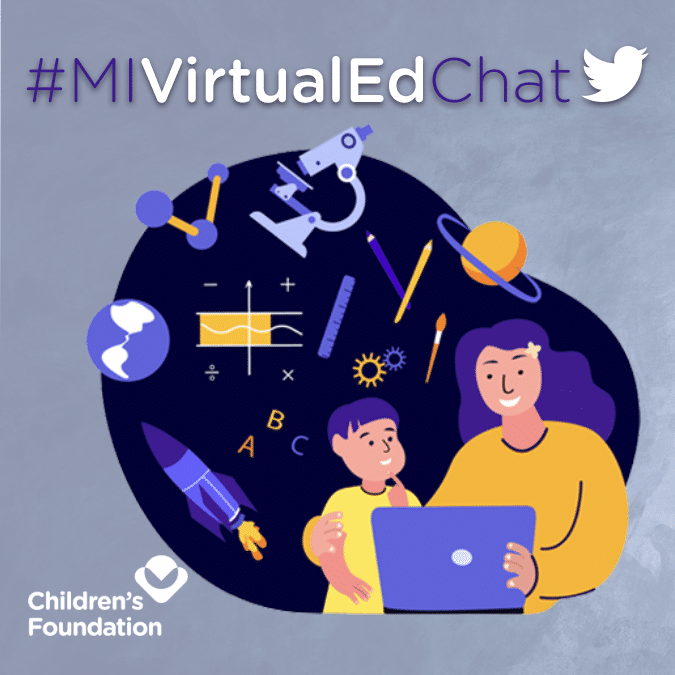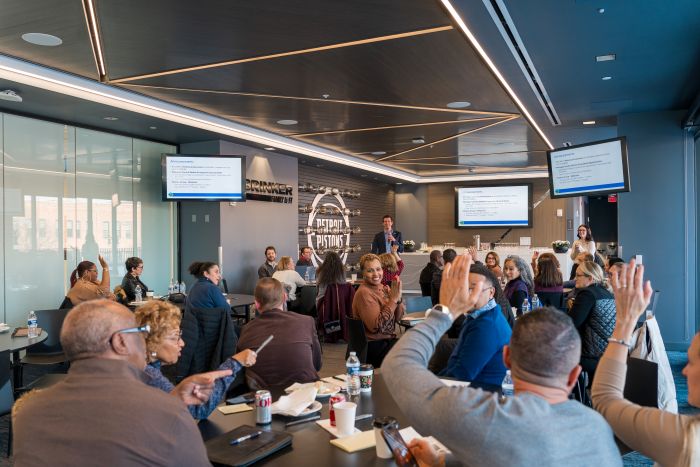
On Wednesday, February 24, The Children’s Foundation hosted a Twitter Chat to bring together educators to discuss the transition back to the classroom, after nearly a year of virtual learning. The conversation highlighted what kind of effects these changes have had on mental health, equity in remote learning, and what families and schools will need to move forward with in-person learning, safely.
Highlights from the conversation are available below; click the question to read all corresponding responses or visit #MIVirtualEdChat on Twitter for a complete review.
- Dr. Robert Shaner (Rochester Community Schools):
- Building and maintaining positive student and staff relationships is critical for success. A strong school culture that promotes love, hope, and inspiration will guide efforts, no matter the learning environment. There is no one-size-fits-all approach. We developed a full-time online learning option to serve those seeking a nontraditional schedule. RCS Virtual Campus is the only online K-12 experience that includes the RCS curriculum taught by our highly skilled teachers.
- Monroe County Intermediate School District:
- Virtual learning can be lonely and frustrating for teachers and students, but especially for K–12 students who lack appropriate & reliable equipment & internet to connect. (We’ve learned) the importance of teachers establishing personal relationships with their students. It has caused us to examine how we rapport build and teach and opened up avenues for creativity in both endeavors.
- Debbie Smith, Oakland Family Services:
- Some students have been successful in the online environment, potentially due to less distractions at home or an increased comfort level in the home environment. Virtual school is not a good fit for others, such as students with special needs or those that need the structure that school provides. Building relationships among students and teachers is also challenging virtually.
- Cindy Eggleton, Brilliant Detroit:
- One positive is the ability to do more things like tutoring. But kids in our network are feeling stressed with so much online without a break. Our referrals for mental health have increased and we are working with MDHHS around increased risk of neglect due to mental health and stress impacting the whole family.
- Kris Marshall, Winning Futures:
- This year has been tough: isolation, loneliness, stress, abuse…going back into school brings excitement, connection, and adult guidance. We have seen students quickly thrive when back in school. We need to remember the negative impacts are long-lasting.
- Dr. Sarah Domoff, Central Michigan University:
- Children with mental health concerns that interfere with learning have experienced great challenges during the pandemic. Children who already experienced challenges in regular school may feel overwhelmed, hopeless, and stressed due to the shift to virtual learning and lack of access to school-based services. However, schools and teachers will need additional resources and supports to facilitate a successful transition back and to promote student well-being.
- Myka Burley, Rocket Community Fund:
- Schools and families alike have had to learn new ways of resourcefulness. The responsibility of supporting students’ digital equity needs should not rest solely on the schools; collaboration and partnership with existing entities and systems is key. Our support of @Connect_313 Connected Futures initiative helped to deploy devices to all of @DPSCD students but there is so much more to be done. Device loaner programs in schools & broadband stipends or access to low-cost internet are all essential.
- Ebony Walls, Rocket Mortgage Classic:
- First step towards equity is identifying the need and those in need. Distributing technology and resources to those Individuals first vs. a curated alphabetical list is a step in the right direction. We must also be flexible in our approach. Some students may need their devices delivered to their homes, other families may need more than one device due to the total number of students per household. A key to support is acknowledging the whole youth’s basic needs beyond learning.
- Nicole McKinney, Friends of the Children Detroit:
- All home learning environments and access to technology is different and is not equal as it would be in school. A child who doesn’t have a dedicated space to learn with multiple people at home can struggle vs. a child who has a dedicated space.
- Dr. Elizabeth Koschmann, TRAILS:
- It’s anticipated that COVID-related increases in poverty, child abuse and neglect, and domestic violence will have catastrophic consequences, including a 30% rise in Michigan’s suicide rate with children and teens at exceptional risk. The recent decision by @gretchenwhitmer to prioritize student mental health places Michigan at the forefront of state-led efforts to address the mental health needs of young people – this is an opportunity for Michigan to be a true leader. But we must act quickly. Delays in systemic planning, provision of support to schools, or delivery of urgently-needed care to students, will create a public health disaster with long-term, devastating consequences for health and educational outcomes.
- Blythe Tyler, CARE House of Oakland County:
- The Oakland County Prosecutor just did an op-ed on ghost children. Those that have just disappeared from schools when the shelter in place order began. We are going to have a hard time getting those kids back to learning. And child abuse reporting is down 50% year over year. Those kids don’t have eyes on them, they have no support. There will be a flood of reports from teachers when schools open up full time.
- Debbie Smith, Oakland Family Services:
- Some students may have fallen behind their peers in specific classes, or they may need to repeat a class or a grade level. Others may be lacking in social skills because they didn’t have the opportunity to practice them during the past year It is likely that many youth will continue to experience depression and anxiety. Some will develop Post-Traumatic Stress Disorder, either directly as a result of the pandemic or indirectly, such as experiencing increased abuse or neglect at home.
- Lucy McGoron, PhD, Wayne State University
- Parents and teachers play a role in creating routines that will help children thrive—regular bedtimes, mealtimes, rest time, and time for homework. Children will need help transitioning to bringing materials to/from school. Having play with peers is crucial too.
- Myka Burley, Rocket Community Fund:
- Reassuring students of safety precautions that will be followed & allowing them to engage in the planning process of returning back to school are key measures for helping them feel comfortable. Their concerns should be heard, considered & addressed. Although many students are excited to be with friends again, they are still carrying trauma, & have a bit of nervousness and anxiety around going back to school, so we must empower them to feel as comfortable, protected, and as safe as possible. Regularly check-in with kids on how they are feeling, give them space to express themselves, & provide them w/ the tools to deal with stress will help to mitigate the jitters they may have. The support of a therapist may be helpful for many students.
- Dr. Robert Shaner (Rochester Community Schools):
- By building on our trusting relationships and reinforcing safety and wellness, we continue to consider the whole child and evaluate social-emotional needs as well as academic growth. The innate love that we have for our students guides our efforts.



